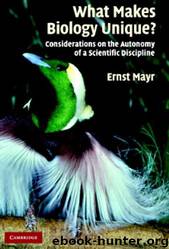What Makes Biology Unique by Ernst Mayr

Author:Ernst Mayr
Language: rus
Format: mobi
Tags: AvE4EvA
ISBN: 9780511217463
Publisher: Cambridge University Press
Published: 2004-06-04T20:00:00+00:00
1979). But the question that is really before us is not so much whether natural selection is now universally adopted by evolutionists – a question one can unhesitatingly answer affirmatively – but rather whether the modern evolutionists’ concept of natural selection is still that of Darwin or is considerably modified.
When Darwin first developed his theory of natural selection, he was still inclined to think that it was able to produce near-perfect adaptation, in the spirit of natural theology (Ospovat 1981). More thinking and the realization of the numerous deficiencies in the structure and function of organisms – perhaps particularly the incompatibility of a perfection-producing mechanism with extinction – led Darwin to reduce his claims for selection, so that all he demanded in the Origin was that “natural selection tends only to make each organism, each organic being, as perfect as, or slightly more perfect than, the other inhabitants of the same country with which it has to struggle for existence” (p. 201). Today we are even more conscious of the numerous constraints that make it impossible for natural selection to achieve perfection, or, to state it perhaps more realistically, to come even anywhere near to perfection (Gould and Lewontin 1979, Mayr 1982a).
The varying fates of Darwin’s five theories
We can now summarize the subsequent fate of each of the five theories of Darwin, which I discussed above. Evolution as such, as well as the theory of common descent, was adopted very quickly. Within fifteen years of the publication of the Origin, hardly a qualified biologist was left who had not become an evolutionist. Gradualism, by contrast, had to struggle, because populational thinking was a concept that apparently was very difficult for anyone to adopt who was not a naturalist. Even today, in the discussions of punctuated equilibria, statements are made that indicate that some people still do not understand the core of population thinking. What counts is not the size of the individual mutation but only whether the introduction of evolutionary novelties proceeds through their gradual incorporation into populations or through the productions of a single new individual that is the progenitor of a new species or higher taxon.
That a theory of the multiplication of species is an essential, in fact integral, component of evolutionary theory, as first pronounced by Wallace and Darwin, is now taken for granted. How this multiplication proceeds is still controversial. That allopatric speciation, and particularly its special form of peripatric speciation (Mayr 1954, 1982c), is the most common mode is widely assumed. That speciation by polyploidy is common in plants is likewise accepted. How important other processes are, like sympatric and parapatric speciation, is still controversial.
Finally, the importance of natural selection, the theory that is usually meant by the modern biologist when speaking of Darwinism, is now firmly accepted by nearly everyone. Rival theories – like finalistic theories, neo-Lamarckism, and saltationism – have been so thoroughly refuted that they are no longer seriously discussed. Where the modern biologist perhaps differs from Darwin most is in assigning a far greater role to stochastic processes than did Darwin and the early neo-Darwinians.
Download
This site does not store any files on its server. We only index and link to content provided by other sites. Please contact the content providers to delete copyright contents if any and email us, we'll remove relevant links or contents immediately.
| Anatomy | Animals |
| Bacteriology | Biochemistry |
| Bioelectricity | Bioinformatics |
| Biology | Biophysics |
| Biotechnology | Botany |
| Ecology | Genetics |
| Paleontology | Plants |
| Taxonomic Classification | Zoology |
Sapiens: A Brief History of Humankind by Yuval Noah Harari(13114)
The Tidewater Tales by John Barth(12045)
Do No Harm Stories of Life, Death and Brain Surgery by Henry Marsh(6349)
Mastermind: How to Think Like Sherlock Holmes by Maria Konnikova(6271)
The Thirst by Nesbo Jo(5818)
Why We Sleep: Unlocking the Power of Sleep and Dreams by Matthew Walker(5678)
Sapiens by Yuval Noah Harari(4574)
Life 3.0: Being Human in the Age of Artificial Intelligence by Tegmark Max(4536)
The Longevity Diet by Valter Longo(4464)
The Rules Do Not Apply by Ariel Levy(3931)
The Body: A Guide for Occupants by Bill Bryson(3852)
The Immortal Life of Henrietta Lacks by Rebecca Skloot(3841)
Why We Sleep by Matthew Walker(3796)
Animal Frequency by Melissa Alvarez(3770)
Yoga Anatomy by Kaminoff Leslie(3724)
Barron's AP Biology by Goldberg M.S. Deborah T(3643)
The Hacking of the American Mind by Robert H. Lustig(3597)
All Creatures Great and Small by James Herriot(3540)
Yoga Anatomy by Leslie Kaminoff & Amy Matthews(3419)
